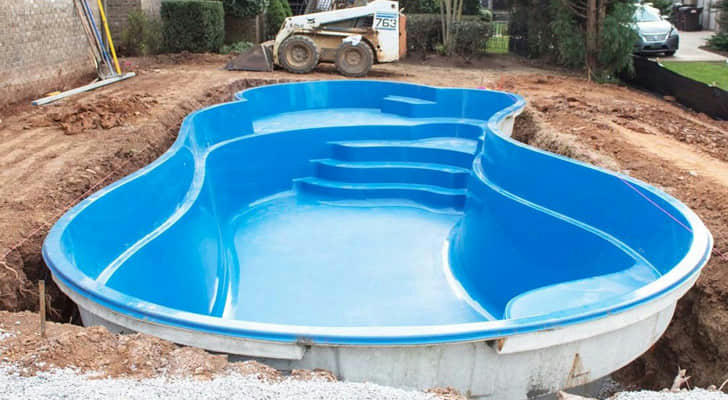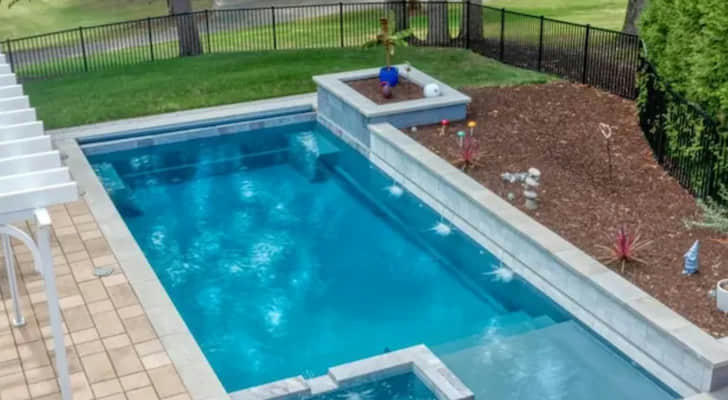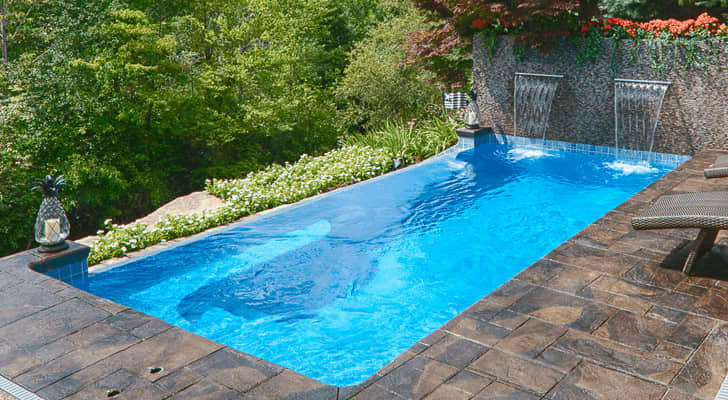Eco-Friendly Choice: Why Fiberglass Pools Are the Best Companion for a Green Lifestyle

As environmental awareness continues to grow, more and more homeowners are considering not only the aesthetics and functionality of swimming pools but also their impact on the environment. Fiberglass pools, with their low energy consumption, reduced water usage, long lifespan, and eco-friendly materials, have emerged as the ideal choice for a sustainable lifestyle. When compared to other types of pool shells, like concrete and vinyl, fiberglass pools offer distinct advantages. This article will explore the environmental benefits of fiberglass pools and provide real-life examples that demonstrate how they contribute to green living.
1. Low Energy Consumption: Save Energy, Reduce Carbon Footprint
Fiberglass pools have a smooth surface and low thermal conductivity, which helps retain water temperature. This natural insulation means less frequent use of pool heating systems, resulting in lower energy consumption and a smaller carbon footprint. Compared to concrete pools, fiberglass pools are more energy-efficient, often reducing heating costs by 30% to 50%.
Advantage Over Other Materials: Concrete pools absorb heat more quickly, requiring more energy to maintain water temperature. In contrast, fiberglass pools' insulation properties reduce energy use, making them a more eco-friendly option.
2. Reduced Water Usage: Less Chemical Use, Water Conservation
The smooth surface of fiberglass pools makes them resistant to algae and other microorganisms, reducing the need for chemicals to maintain water quality. Fewer chemicals mean the water remains more stable, requiring less frequent water changes, which conserves water. Unlike vinyl pools, which can degrade due to exposure to chemicals, fiberglass pools remain durable without the need for frequent liner replacements, further reducing water waste.
Advantage Over Other Materials: Vinyl pools are susceptible to chemical damage and require liner replacements, which increases water waste and maintenance costs. Fiberglass pools, however, don't require liners, making them easier to maintain and more environmentally friendly.
3. Longevity and Durability: Less Waste, Longer Lifespan
Another key advantage of fiberglass pools is their long lifespan. Fiberglass pools typically last over 25 years with minimal need for major repairs or replacements. By contrast, concrete pools often require resurfacing every 10 to 15 years, and vinyl pools need liner replacements more frequently. The extended lifespan of fiberglass pools means less material waste and reduced environmental impact over time.
Advantage Over Other Materials: Vinyl and concrete pools have shorter lifespans and require frequent repairs or replacements. Fiberglass pools, by comparison, are easier to install, have a longer lifespan, and generate less waste, making them both eco-friendly and cost-effective.
4. Eco-Friendly Materials: Greener Production Process
Fiberglass is considered an eco-friendly material, with relatively low emissions produced during its manufacturing process. Additionally, fiberglass pools require less energy and fewer resources to install compared to concrete pools, which take longer to build. The fast installation process of fiberglass pools minimizes the environmental impact of construction, making them a greener option from start to finish.
Advantage Over Other Materials: Concrete pools take longer to build, require more resources, and produce more construction waste. Fiberglass pools are factory-made, allowing for quick installation and less disruption to the environment during construction.

Real-Life Case Studies
In Florida, the Smith family chose a fiberglass pool primarily for its energy efficiency. After a year of use, they noticed a 40% reduction in their pool heating costs and a significant decrease in chemical usage, resulting in more stable water quality. The family also saved considerable water resources due to fewer water changes, making them feel proud of their contribution to a greener planet.
Similarly, a couple in California had a great experience after switching to a fiberglass pool. Their previous concrete pool required costly annual maintenance and repairs, but since installing the fiberglass pool, they've had virtually no maintenance concerns. The reduced water use and minimized chemical needs have given them peace of mind, knowing their pool is both economical and eco-friendly.
Conclusion: Fiberglass Pools Are the Ideal Choice for Green Living
In summary, fiberglass pools offer numerous green benefits, including low energy consumption, reduced water usage, a long lifespan, and eco-friendly materials. Compared to other pool types, they stand out with lower maintenance costs, better durability, and faster installation. As seen from real-life examples, fiberglass pools help families save on energy, water, and maintenance costs while significantly reducing their environmental impact.
If you are looking for an eco-friendly pool solution, fiberglass pools are the ideal choice, offering both high-quality living and a commitment to sustainable development.

